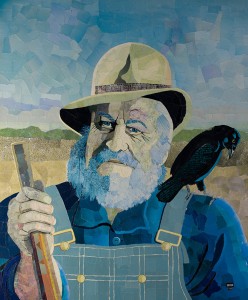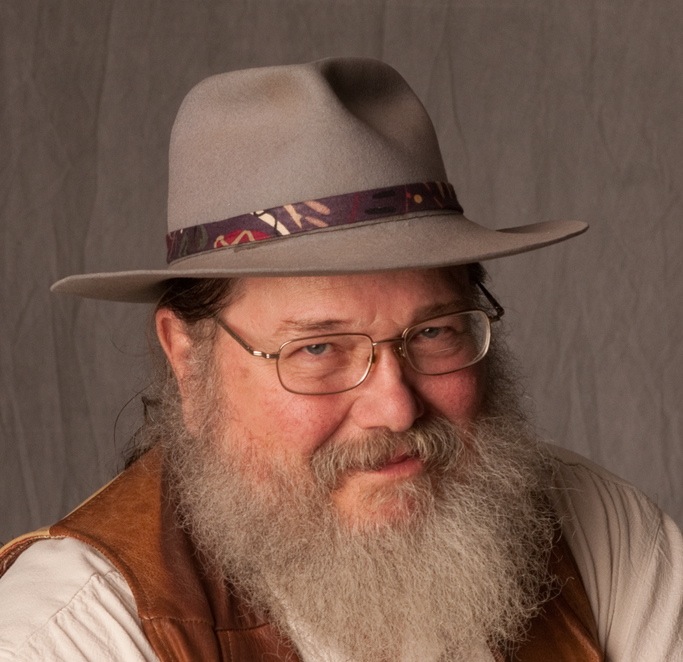 As a child, I often found myself reading books I heard my sister Kathy talk about. She read aloud poems that moved her or passages that just demanded sharing. She guided me into The Harvester by Gene Stratton Porter at about age 10. There I first engaged a consuming romantic love that suffered greatly and played out against the world of medicinal herbs. Heady stuff for a pre-pubescent boy. She recognized a good story and encouraged my efforts in the midst of our chaos. Her last act before escaping the family to work for Gooch Meat Packing was to give me a spiral bound notebook and to tell me pointedly my stories had value. Straightaway, I climbed into the metal bench swing Daddy had hung between two elms and started writing my tale: The Call of The Rain Crow, about a vengeful Indian brave who made the echoing call of a rain crow just before he wreaked righteous judgment on guilty parties.
As a child, I often found myself reading books I heard my sister Kathy talk about. She read aloud poems that moved her or passages that just demanded sharing. She guided me into The Harvester by Gene Stratton Porter at about age 10. There I first engaged a consuming romantic love that suffered greatly and played out against the world of medicinal herbs. Heady stuff for a pre-pubescent boy. She recognized a good story and encouraged my efforts in the midst of our chaos. Her last act before escaping the family to work for Gooch Meat Packing was to give me a spiral bound notebook and to tell me pointedly my stories had value. Straightaway, I climbed into the metal bench swing Daddy had hung between two elms and started writing my tale: The Call of The Rain Crow, about a vengeful Indian brave who made the echoing call of a rain crow just before he wreaked righteous judgment on guilty parties.
A few years later, I would take leave of the family myself and embark on literal and metaphorical journeys of my own. It would be 42 years before I would see Kathy again. One of those trails led me to the little mountain town of Flagstaff, where I still work as a musician and storyteller.
One night I stepped into the Weatherford and found a handful of patrons listening to a grizzled guitarist hold forth. It only took a moment for me to realize I was listening to U. Utah Phillips, the Golden Voice of the Southwest! But there had been no ad in the paper, no posters around town, not even a hand-written notice on the door. Entranced, I sat with a dozen people and basked in the wit and humor of a legend. Oh the songs … the songs and the stories rising and falling in a timeless rhythm honed to feed my ancient hunger. He finished his performance and began to dismantle his little altar piece composed of bandana, picks and harmonicas and IWW pins. I approached and introduced myself and apologized for the poor turnout. I told him that I knew nothing about promotion, but if he would call me the next time he came to town I would see he had a better audience.
I told him how much I liked his song “Rock Salt and Nails.” “You like it? You can have it. It’s a bitter song and I don’t feel that way anymore.” He told me of working for the Episcopal mission in Bluff, Utah when he fell in love and was married. His father brought the tiered wedding cake down from Salt Lake City on the back seat of an old touring car over unimproved dirt roads. The cake kept bouncing up and hitting the ceiling of the car. Utah recalled the Navajo kids eating cake icing off the headliner of the car. A traditional wedding hogan had been built on the flat of a dry wash. That night it rained and they awoke to find their honeymoon cabin surrounded by racing waters. In short order he was called up to serve in the Korean conflict. The experiences he had there changed him forever. He was scarred and numb and crammed in the bowels of a troopship headed home when he received a “Dear John” letter from his new wife. Utah wrote a song about the San Juan River’s red rock shores and the knife-edged anger of betrayal and loss. Utah never performed the song, but his friend Rosalie Sorrels promoted it with his other powerful songs. Ironically, the bluegrass community claimed “Rock Salt and Nails” as an Appalachian anthem that conjured images of misty, fern-grown hollers.
That was the beginning of a fine friendship. For several decades when he was in the area he stayed in my home and I produced his concerts. I treasure the conversations we had over coffee at my kitchen table when he talked about his trade craft and philosophy of being an entertainer. While my youngest daughter was still a boy she had a handsome Borsalino fedora that Utah admired, and she gave it to him. The deed had been forgotten when she received a large box a year later containing a dozen hats from straw boaters to belled jesters caps. One night when he was our guest, I heard him stirring in the night. I checked on him and found him in distress, his breathing labored. His tattoos were faded and glistened with sweat. I took him to my internist the next morning for testing and the EKG foretold the failing heart that would eventually claim his life.
After Korea, Utah rode the rails and drank to forget until a stint at the Joe Hill House helped him to channel the anger and fear of his war experiences into a life of non-violent activism and protest. He worked with the IWW, the Industrial Workers of the World labor union and helped establish the Hospitality House to serve the homeless in Grass Valley, Calif.
I once booked Utah to do an assembly for my wife’s school to fill out his visit to town. The principal joined us in the rear of the auditorium as Utah addressed the high school classes. “You are about to be told one more time that you are America’s most valuable natural resource. Have you seen what they do to valuable natural resources?! Have you seen a strip mine? Have you seen a clear cut in the forest? Have you seen a polluted river? Don’t ever let them call you a valuable natural resource! They’re going to strip mine your soul. They’re going to clear cut your best thoughts for the sake of profit unless you learn to resist.”
Utah continued to be an outspoken advocate for workers, homeless, hoboes and the disenfranchised until he died of heart failure in 2008.
Last week I traveled across the country to visit Kathy in her home in Rhode Island. She told me about a retreat she had taken 20 years ago to Santa Fe, N.M. to work on her art. She creates amazing collages by applying small bits of color torn from photographs taken from National Geographic magazines to a board. While she related her process and showed us her work, she mentioned that she had seen a small inch by two-and-a-half inch black and white photo of a bearded man in the newspaper. “Sometimes I see a face and I know I have to do them.”
“Charlie, go upstairs and get it for me.” Her husband came downstairs with a large framed picture of a man with a hat and full white beard and glinting blue eyes. “His beard is made from ice covered tree tops, his skin is stone. The crow’s wing is names from the Vietnam Veteran’s Memorial.” I looked at Sue and burst into laughter. “It’s Utah!’’
The UPS man delivered a large package yesterday. When I saw my sister’s return address I could only smile and say “It’s Utah.” After all these years, we are still sharing stories.
Watch the videos below of Tony performing Rock Salt and Nails, the song that Utah Phillips gave him, and of Utah Phillips performing his song, Enola Gay.

